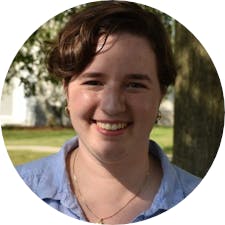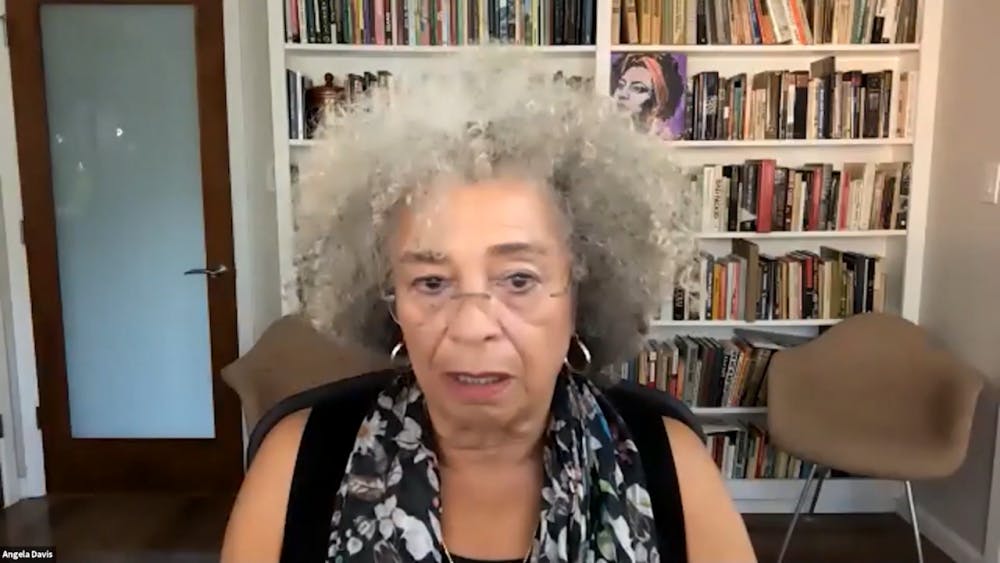Across campus, students gathered around television and computer screens and stared down at their phones while walking between buildings to watch renowned civil rights activist and educator Angela Davis answer student questions over Zoom on Oct. 28. Nearly 500 people tuned in to watch “An Evening with Angela Davis,”an event sponsored by Middlebury College Activities Board and co-hosted by the Black Student Union and Distinguished Men of Color.
Rather than a traditional talk, the event began with 30 minutes of pre-submitted student questions, followed by 45 minutes of live questions fielded by student moderators. Organizers hoped that the unusual format of the talk would tailor the experience to Middlebury students and their interests.
The event covered a wide range of topics, including Davis’ childhood and the beginning of her activism, her position as a vocal advocate of prison and police abolition, her views on intersectionality and her hopes for current students and coming generations.
Davis grew up in highly segregated Birmingham, Ala., in the 1940s and 1950s. A staunch believer in civil rights and equality from an early age, she joined the Black Panthers and the Communist Party.
“It was not possible to live in that kind of world and retain one’s dignity without resisting, without fighting back,” Davis said. “I knew that it was my responsibility to participate in the effort to change our surroundings and change our conditions and to move toward a world in which there would be justice and equality and freedom.”
For Davis, silence was never an option. As a shy young woman, she never intended to become a figurehead. Instead, she had planned to contribute to the movements she cared about as an intellectual. Although Davis empathizes with the many people whose silence comes from fear rather than ambivalence, she encouraged students not to fear the consequences of their actions as individuals, but to find courage in the collective of a movement.
Davis is all too familiar with individual consequences. She rose to prominence as an activist after the University of California, Los Angeles fired her from her position as a philosophy professor due to her affiliation with the Communist Party. Then, the national spotlight turned to her after she aided in the botched escape attempt of George Jackson in 1970. Before she was caught, the FBI listed her as one of their most wanted criminals. She served 18 months in jail — often in solitary confinement — and she faced the death penalty in court.
She was acquitted in 1972, but her time in prison has profoundly impacted her life and activism.
“I think I’ve lived the best life I could have possibly lived,” she said. “Even the things that have been really terrible that have happened to me, I realize now I’ve learned from them. They’ve been gifts. Even the time I spent in jail and on the FBI’s most wanted list and facing the death penalty. That was a gift because I learned so much.”
Davis has carried those lessons with her through a career as a leading activist. She is one of the most prominent advocates for police and prison abolition, positions that have garnered national attention in the wake of the police killings of Georgy Floyd and Breonna Taylor this year and the gathering momentum of the Black Lives Matter movement across the country.
Davis believes that the police and carceral systems were founded on racism and that no reform can ever divorce them from their past. Efforts to reform these institutions over the past century have only served to strengthen and legitimize them. She views the current punitive model of the current American justice system as ineffective at actually protecting people and their rights. Davis advocates for abolishing prisons and police and creating new, better institutions in their place.
When it comes to police officers killing unarmed Black civilians, Davis does not agree with calls to imprison criminal cops. Instead, she prioritizes constructing institutions that will prevent the deaths of any more Black people at the hands of the police.
“A punitive, retributive approach, regardless of who it is directed at, is never going to accomplish anything,” she said. “I want to create the framework for forms of justice that will be more compelling and that will help us rid our world of racist violence.”
Davis’s activism reaches far beyond civil rights and abolition movements. A vocal advocate for women’s rights, class struggle, LGBTQ+ rights and many more progressive issues, she rejects the hierarchical view that activists must prioritize one issue over the rest to be effective. Instead, she encouraged students to view all of these issues as connected to each other, nationally and internationally, and to work to solve them where they intersect.
Davis told students, no matter which issues they care about, to vote in the general election and to vote for Vice President Joe Biden and Senator Kamala Harris. While she does not agree with many of their policies nor see them as nearly radical enough for the moment at hand, Davis emphasized that a Biden-Harris administration would create more opportunities for activism, while those opportunities would shrink under another Trump term.
“I am going to vote for Joe Biden and Kamala Harris, but I’m not really voting for them,” she said. “I’m voting for us. I’m voting for our own capacity to continue to the work that has begun so powerfully during this period [after] the murder of Breonna Taylor and the state lynching of George Floyd.”
Davis ended the talk on a note of hope for the future directed at the students listening.
“I’ll be 77 in January, and in all of these years I don’t think I’ve ever experienced such an exciting moment, and it's largely because of young people . . . leading the way,” said Davis. “I trust you. I place my hope in the work that you’re doing over this period and in the coming years and decades.”

Sophia McDermott-Hughes ’23.5 (they/them) is an editor at large.
They previously served as a news editor and senior news writer.
McDermott-Hughes is a joint Arabic and anthropology and Arabic major.
Over the summer, they worked as a general assignment reporter at Morocco World News, the main English-language paper in Morocco.
In the summer of 2021 they reported for statewide digital newspaper VTDigger, focusing on issues relating to migrant workers and immigration.
In 2018 and 2019, McDermott-Hughes worked as a reporter on the Since Parkland Project, a partnership with the Trace and the Miami Herald, which chronicled the lives of the more than 1,200 children killed by gun violence in the United States in the year since the Marjory Stoneman Douglas High School shooting in Florida.




